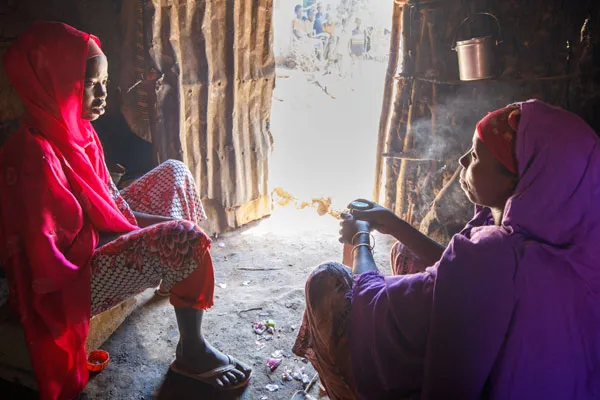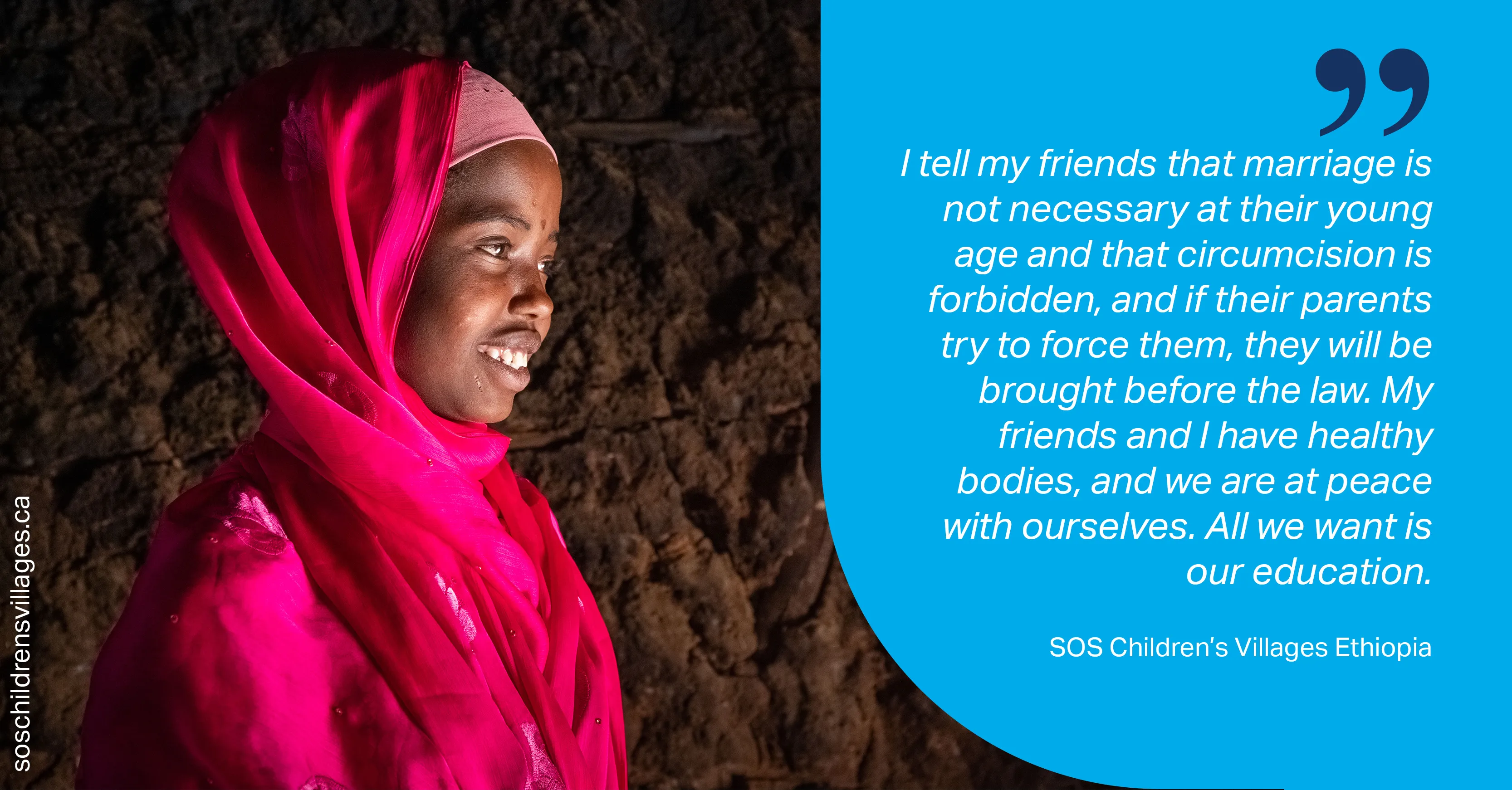Educating about traditional practices that violate children’s rights in Ethiopia

Selam*, 11, arrived home from school one day and found her mother with an older woman waiting for her. Her mother said they wanted a tiny part of her body cut off.
Selam knew what the two women meant.
A strong woman would hold her down, and her clitoris would be cut. Then, she would bleed a lot. Some girls fainted from the procedure, and others died. Some visitors had talked about it at her school.
Selam dropped her books on the floor and asked to be excused to go to the toilet.
“I stood outside for a little while and then ran to report them. I was afraid that my mother and the circumciser would grab me and circumcise me by force.”
Selam, a grade three student who dreams of being a doctor one day, lives in a village on the outskirts of Harar, an old town in Eastern Ethiopia, where the practice of female genital mutilation (FGM) is widespread.
All the women in this village have gone through ‘the cut’ and want it for their girls. Selam, the firstborn of eight children - four girls and four boys - has refused it and insists she wants to attend school. The healing time, adverse health consequences, and following tradition into early and forced marriage would require her to abandon her studies.
Only a few years ago, Selam’s act of defiance was unimaginable.
Eradicate the cut
Selam ran to the Ministry of Women and Children Affairs office in her community and confided in Halima, a women’s representative who is very vocal about female genital mutilation.
Halima has taught children in Selam’s school about the dangers of genital mutilation and encouraged them to report any incident.
This deeply engrained cultural practice can lead to many severe lifelong health problems that include childbirth complications, psychological trauma, difficulty passing urine, painful menstruation and intercourse.
The Ministry works closely with SOS Children’s Villages Ethiopia to educate the community about traditional practices that violate children’s rights.
This Joint Forces for Africa (JOFA) project hopes to reach more than 50,000 children. JOFA is an alliance of the six largest child-focused International Non-Governmental Organisations (INGOs) working to end all forms of violence against children. SOS Children’s Villages is the implementing partner in two rural districts in Ethiopia.
“Halima has told us not to agree to such things,” says Selam. “It is dangerous, and we should go straight to her if they [parents] try to circumcise us.”
FGM has been prohibited under Ethiopia’s criminal code since 2004. According to UNFPA, 74% of women aged 15 - 49 years in the country have undergone FGM.
In Africa, 28 countries subject women to the cut: Somalia, Sudan, Kenya, Ethiopia, Sudan, Tanzania, and Uganda in eastern and Southern Africa. Somalia has the highest rate of FGM in the world, with about 98% of women having undergone the procedure.
Engrained culture
Conservative forces in Salem’s village say it is an integral part of culture that should be preserved. Once the girl heals after about two months, she is considered ready for marriage.
“We call people for meetings and discuss it,” says Halima. “We are undoing generations of misconceptions that the clitoris is dirty and impure, that it turns girls into prostitutes, and that it prevents them from having babies.
“When I went to Selam’s house, I asked them [mother and circumciser] if they would abide by the law,” Halima says. “I asked whether they had information on FGM. They said yes and admitted that their attempt to cut Selam was a mistake. I immediately took them to the law [police].”
Selam’s mother, Sieda, says she arranged for her first-born daughter to be circumcised “because it is our custom. We believe that the part we remove is impure,” she says.
“Our fathers did it to us, and that is why we want to do it to our children. But the Women's Affairs officials have told us that it is illegal. I have sworn not to do it again.”
Sieda and the circumciser were each fined 3,000 Ethiopian Birr (72 Canadian Dollars) and were kept in a police cell for two days.
“We warned the professional (circumciser) that she would be penalized severely according to the law if she were ever to be found doing this again,” says Halima.
“And to the mother, we told her she was responsible for taking this generation into the future, unharmed, and she would be held responsible culturally and legally if she would participate again.”
“My mother asked me why I reported them, and I told her that a girl had already died while undergoing circumcision,” says Selam, “and I did not want it because the bleeding might not stop. And that I do not want to get married because I am still in school.”
Halima says that since the ministry started working with SOS Children’s Villages two years ago, 26 girls have been rescued from the cut, and eight others have been saved from early and forced marriage.
Resistance
But changing a culture practiced for millennia is not easy.
The village elders, mostly men, are not receptive to the change. They argue that womanhood is defined by the cut, which means that men cannot take them as wives without it.
Halima’s office works with religious leaders, hoping they will use their clout and influence to convince the elders and other men.
Seida says Selam’s father has agreed that the practice should stop.
“Why get in trouble? Do not circumcise my girls. Do not expose them to the problems you have gone through,” he says, making it clear that he is against FGM.
“I was circumcised as a little girl, and I know the pain I have suffered,” adds Seida. “I do not want them [my daughters] to go through it because of my own experience and ignorance.”
Young ambassador
Selam is now well-known in her community for advocating against FGM.
She speaks confidently at community gatherings and school about her story of avoiding the cut and that her parents have changed their minds about the practice. “I tell my friends that marriage is not necessary at their young age and that circumcision is forbidden,” she says.
“The girls must continue with their education. And if their parents try to force them, they will be brought before the law. Parents have stopped pushing for circumcision upon hearing this message. My friends and I have healthy bodies, and we are at peace with ourselves. All we want is our education.”
*Name changed to protect privacy.

